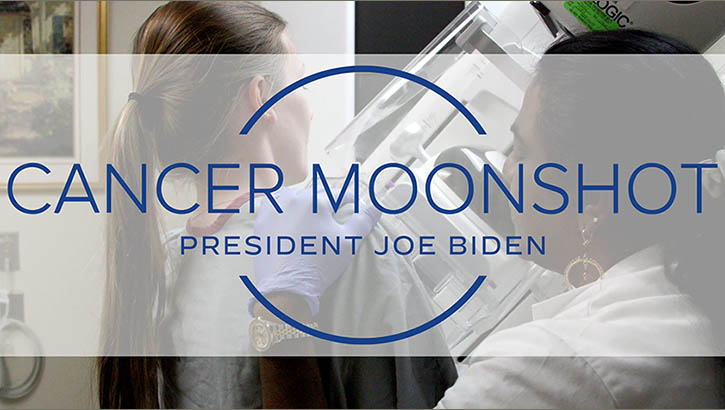On Feb. 2, 2024, President Biden celebrated the two-year anniversary of the reignited 2016 White House Cancer Moonshot initiative, an effort across multiple federal agencies aimed to reduce the death rate from cancer by at least 50 percent over the next 25 years. Cancer Moonshot is also focused on improving the experience of people and their families living with and surviving cancer, with a goal to ultimately end cancer. To that end, the military medical community has made great strides and advancements.
Uniformed Services University’s Murtha Cancer Center Research Program in Bethesda, Maryland leads the DOD’s component of Cancer Moonshot’s efforts. Among many groundbreaking research projects, the Program has achieved national acclaim for its role in ovarian cancer research, development of targeted therapies for breast cancer that doesn’t respond to treatment, as well as lung and skin cancer research.
In response to Cancer Moonshot, the DOD, the Department of Veterans Affairs, and the National Cancer Institute created the Applied Proteogenomics Organizational Learning and Outcomes Network. As a trial network, APOLLO was part of a White House "reignition" Fact Sheet: President Biden Reignites Cancer Moonshot to End Cancer as We Know It. APOLLO originally included 13 DOD and VA hospitals that launched eight cancer-specific programs, including studies in lung, breast, prostate, ovarian, pancreatic, testicular, and brain cancers. Today, APOLLO is comprised of 15 DOD and VA hospitals and has expanded to studies of all cancer types.

At its initial launch in 2016, Cancer Moonshot set forth three ambitious goals:
- Accelerate scientific discovery in cancer
- Foster greater collaboration
- Improve the sharing of data
Cancer Moonshot has united a large community of investigators and clinicians who are dedicated to expediting research to improve the lives of people with cancer and their loved ones.
Related Websites
You also may be interested in...
Article
Jun 5, 2024
June 2024 is Men’s Health Month, and Defense Health Agency Public Health officials are reminding males of the importance of taking charge of their health for a longer, happier lifestyle.
Article
May 1, 2024
Colorectal cancer is on the rise in people under 50 in the United States. Recent guidelines state that anyone at average risk for colorectal cancer should start getting screenings at age 45. Getting screened is easy, and TRICARE covers several options for colorectal cancer exams.
Article
Apr 23, 2024
Recently learned you’re expecting a baby? Congratulations! TRICARE is here to help you get the care you need during pregnancy. As you get ready to welcome your child, learn more about how TRICARE covers maternity services.
Article
Apr 9, 2024
Catching cancer early is one of the best ways to protect yourself and your loved ones from cancer. Routine cancer screening tests can find many common cancers before they cause symptoms.
Article
Apr 4, 2024
Keeping your heart healthy is important at every age. Catching heart disease early gives you the best chance for treatment to work well—and TRICARE makes it easy to get the preventive care you need.
Article
Mar 27, 2024
Pregnancy and hormones play a role in women’s increased risk of heart disease and life expectancy.
Article
Mar 12, 2024
Heart health was the topic of the day for the first program in a series titled, “Serving in Strength: Health and Wellness Series,” sponsored by the Military Women’s Memorial on Feb. 29, 2024.
Article
Feb 7, 2024
U.S. Navy Capt. (Dr). Kelly Elmore, an OB/GYN, talks about pregnancy and postpartum resources within the Military Health System as we Ask the Doc.
Article
Nov 15, 2023
Our expert answers questions about mammograms and breast health in Ask the Doc.
Article
Aug 23, 2023
The Defense Health Agency announced the five-year extension of the Laboratory Developed Tests Demonstration. The DHA extended the demonstration from July 19, 2023 through July 18, 2028. The DHA also announced that TRICARE will now cover several preconception and prenatal carrier screenings as part of the basic TRICARE benefit.
Article
Aug 17, 2023
Prostate cancer is one of the most common cancers in men, with the National Cancer Institute estimating over 280,000 diagnoses in 2023. However, promising new treatments and updated testing guidelines are leading to better patient outcomes.
Article
Jun 20, 2023
Did you know that June is Men’s Health Month? If you’re a man, it’s a good time to take stock of your overall health. According to the Centers for Disease Control and Prevention, the life expectancy for men in the U.S. is nearly six years less than that for women. And that gap is getting wider. However, men can still live long, healthy lives by eating ...
Article
Mar 20, 2023
HIV pre-exposure prophylaxis drugs, otherwise known as PrEP, are powerful weapons against HIV. Through education and raising awareness of HIV exposures, the risks of getting the disease are lower than ever.
Article
Mar 16, 2023
TRICARE develops pilots and demonstrations to test new medical services, treatments, and approaches. These include initiatives for autism care, childbirth support, and low back pain. Certain groups have the chance to benefit from these services during an evaluation period. Results from these programs may inform future benefit changes.
Article
Mar 1, 2023
This annual update provides rates of incidence and infection of STIs among active component U.S. service members.
You are leaving Health.mil
The appearance of hyperlinks does not constitute endorsement by the Department of Defense of non-U.S. Government sites or the information, products, or services contained therein. Although the Defense Health Agency may or may not use these sites as additional distribution channels for Department of Defense information, it does not exercise editorial control over all of the information that you may find at these locations. Such links are provided consistent with the stated purpose of this website.
You are leaving Health.mil
View the external links disclaimer.
Last Updated: February 05, 2024